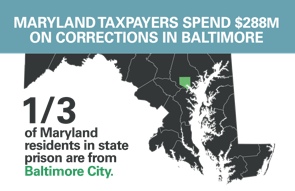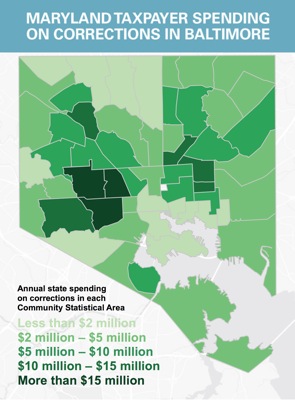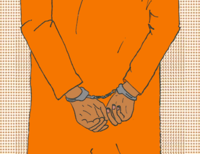New Study: Maryland taxpayers spend $288 million a year to incarcerate people from Baltimore City
Groundbreaking report maps incarceration and spending, suggests more effective alternative investments
February 25, 2015
Groundbreaking report maps incarceration and spending, suggests more effective alternative investments
CONTACT:
Marie Yeager
717-817-3333
management@rodacreative.com
Washington, DC – According to a new report released today by the Justice Policy Institute and the Prison Policy Initiative, Maryland taxpayers are spending $5 million or more to incarcerate people from each of about half of Baltimore’s communities (25 of 55), with total spending of $288 million a year on incarcerating people from Baltimore in Maryland’s prisons.
 Based on data recently made available by a new Maryland law, The Right Investment?: Corrections Spending in Baltimore City shows for the first time where people who are incarcerated are from, and how much Maryland taxpayers spend on their incarceration. The report includes detailed maps and information that can better inform investment decisions in these communities to help solve long-standing challenges and improve public safety.
Based on data recently made available by a new Maryland law, The Right Investment?: Corrections Spending in Baltimore City shows for the first time where people who are incarcerated are from, and how much Maryland taxpayers spend on their incarceration. The report includes detailed maps and information that can better inform investment decisions in these communities to help solve long-standing challenges and improve public safety.
“Spending $288 million every year to incarcerate people from Baltimore isn’t the right choice for Maryland taxpayers,” said Marc Schindler, executive director of the Justice Policy Institute. “This costly investment in incarceration can decrease public safety, and undermine the ability to redirect funds to better long-term solutions that could prevent crime from happening in the first place, including education, housing, drug treatment and employment opportunities.”
The Right Investment? shows that the 25 Baltimore communities where taxpayers spend $5 million dollars or more on incarceration are also the places that experience disproportionate unemployment, greater reliance on public assistance, higher rates of school absence, higher rates of vacant and abandoned housing, and more addiction challenges. The 25 communities also experience lower life expectancy, lower rates of educational attainment, and lower incomes than the rest of Baltimore. The Right Investment? illustrates how the money currently spent on incarceration could instead be better invested in treatment, housing, education, and employment services in these communities.
 “This report combines never-before analyzed geographic data with key metrics on community well-being to allow policymakers to make informed choices about how best to allocate precious taxpayer resources,” said Peter Wagner, executive director of the Prison Policy Initiative.
“This report combines never-before analyzed geographic data with key metrics on community well-being to allow policymakers to make informed choices about how best to allocate precious taxpayer resources,” said Peter Wagner, executive director of the Prison Policy Initiative.
The report is particularly timely because legislators in Annapolis are currently considering a range of policy proposals that could significantly affect corrections spending. Pending legislation includes proposed bills to reduce mandatory minimum prison sentences, reduce the barriers to getting a job after having been convicted of a crime, and create a council to look specifically at how to reduce spending on corrections and reinvest in strategies to increase public safety and reduce recidivism. Fortunately, a proposal from 2013 that recommended the state spend a half-billion dollars on a new jail for Baltimore City has not been included in the Governor’s proposed budget, though the plan has not been explicitly taken off the table.
“This report should lead to a much more informed discussion on how taxpayer money is being spent in these communities,” said Delegate Jill Carter (D-Baltimore City-41). “Along with passing legislation that we know will help reduce the number of people going to prison, shorten their sentences and reduce criminal justice spending, policymakers and the public need better tools to help measure whether we are making the right investments in these communities.”
The Right Investment? is a collaborative effort between the Justice Policy Institute and the Prison Policy Initiative. This report is based on data and information generated by the state of Maryland and research organizations such as the Baltimore Neighborhood Indicators Alliance. Funding for the study was provided by the Open Society Institute–Baltimore, and other foundations that support the partners.
“I introduced the No Representation Without Population Act to provide better data for redistricting purposes, and I’m now looking forward to using all the data and information generated by this law to directly enlighten future criminal justice policy choices in Maryland”, said Delegate Joseline Peña-Melnyk (D-Prince George’s and Anne Arundel-21), the lead sponsor of the law in the House of Delegates.
The full report includes specific analyses of each of Baltimore’s 55 communities, as well as additional data about the number and rates of people incarcerated in other Maryland communities. A complete version of The Right Investment? is available at https://justicepolicy.org/research/the-right-investment-corrections-spending-in-baltimore-city/ and PrisonPolicy.org/origin/.
For more information, contact Marie Yeager at 717-817-3333 or management@rodacreative.com.
###
The Justice Policy Institute, based in Washington, D.C., is working to reduce the use of incarceration and the justice system and promote policies that improve the well-being of all people and communities. The Prison Policy Initiative, a national organization based in Easthampton, Mass. produces cutting edge research to expose the broader harm of mass criminalization, and then sparks advocacy campaigns to create a more just society. For more information on the partners’ work and publications, visit their websites at www.justicepolicy.org and www.prisonpolicy.org.




[…] jointly with the Justice Policy Institute, we released a new report that for the first time mapped where people incarcerated in Maryland state prisons […]